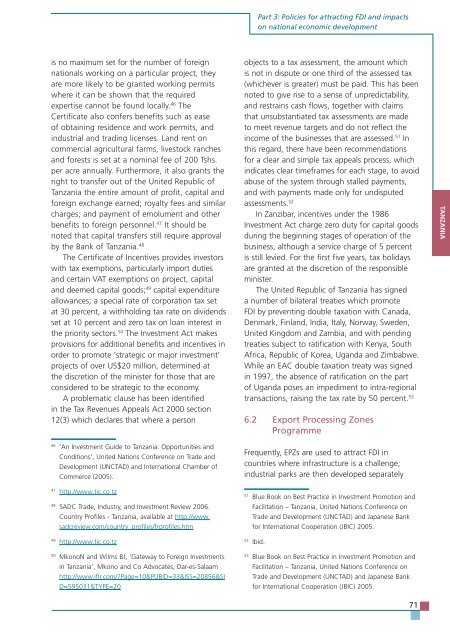TRENDS AND IMPACTS OF FOREIGN INVESTMENT IN DEVELOPING COUNTRY AGRICULTURE
TRENDS AND IMPACTS OF FOREIGN INVESTMENT IN DEVELOPING COUNTRY AGRICULTURE
TRENDS AND IMPACTS OF FOREIGN INVESTMENT IN DEVELOPING COUNTRY AGRICULTURE
Create successful ePaper yourself
Turn your PDF publications into a flip-book with our unique Google optimized e-Paper software.
is no maximum set for the number of foreign<br />
nationals working on a particular project, they<br />
are more likely to be granted working permits<br />
where it can be shown that the required<br />
expertise cannot be found locally. 46 The<br />
Certificate also confers benefits such as ease<br />
of obtaining residence and work permits, and<br />
industrial and trading licenses. Land rent on<br />
commercial agricultural farms, livestock ranches<br />
and forests is set at a nominal fee of 200 Tshs.<br />
per acre annually. Furthermore, it also grants the<br />
right to transfer out of the United Republic of<br />
Tanzania the entire amount of profit, capital and<br />
foreign exchange earned; royalty fees and similar<br />
charges; and payment of emolument and other<br />
benefits to foreign personnel. 47 It should be<br />
noted that capital transfers still require approval<br />
by the Bank of Tanzania. 48<br />
The Certificate of Incentives provides investors<br />
with tax exemptions, particularly import duties<br />
and certain VAT exemptions on project, capital<br />
and deemed capital goods; 49 capital expenditure<br />
allowances; a special rate of corporation tax set<br />
at 30 percent, a withholding tax rate on dividends<br />
set at 10 percent and zero tax on loan interest in<br />
the priority sectors. 50 The Investment Act makes<br />
provisions for additional benefits and incentives in<br />
order to promote ‘strategic or major investment’<br />
projects of over US$20 million, determined at<br />
the discretion of the minister for those that are<br />
considered to be strategic to the economy.<br />
A problematic clause has been identified<br />
in the Tax Revenues Appeals Act 2000 section<br />
12(3) which declares that where a person<br />
46 ‘An Investment Guide to Tanzania: Opportunities and<br />
Conditions’, United Nations Conference on Trade and<br />
Development (UNCTAD) and International Chamber of<br />
Commerce (2005).<br />
47 http://www.tic.co.tz<br />
48 SADC Trade, Industry, and Investment Review 2006.<br />
Country Profiles - Tanzania, available at http://www.<br />
sadcreview.com/country_profiles/frprofiles.htm<br />
49 http://www.tic.co.tz<br />
50 MkonoN and Wilms BJ, ‘Gateway to Foreign Investments<br />
in Tanzania’, Mkono and Co Advocates, Dar-es-Salaam<br />
http://www.iflr.com/?Page=10&PUBID=33&ISS=20856&SI<br />
D=595031&TYPE=20<br />
Part 3: Policies for attracting FDI and impacts<br />
on national economic development<br />
objects to a tax assessment, the amount which<br />
is not in dispute or one third of the assessed tax<br />
(whichever is greater) must be paid. This has been<br />
noted to give rise to a sense of unpredictability,<br />
and restrains cash flows, together with claims<br />
that unsubstantiated tax assessments are made<br />
to meet revenue targets and do not reflect the<br />
income of the businesses that are assessed. 51 In<br />
this regard, there have been recommendations<br />
for a clear and simple tax appeals process, which<br />
indicates clear timeframes for each stage, to avoid<br />
abuse of the system through stalled payments,<br />
and with payments made only for undisputed<br />
assessments. 52<br />
In Zanzibar, incentives under the 1986<br />
Investment Act charge zero duty for capital goods<br />
during the beginning stages of operation of the<br />
business, although a service charge of 5 percent<br />
is still levied. For the first five years, tax holidays<br />
are granted at the discretion of the responsible<br />
minister.<br />
The United Republic of Tanzania has signed<br />
a number of bilateral treaties which promote<br />
FDI by preventing double taxation with Canada,<br />
Denmark, Finland, India, Italy, Norway, Sweden,<br />
United Kingdom and Zambia, and with pending<br />
treaties subject to ratification with Kenya, South<br />
Africa, Republic of Korea, Uganda and Zimbabwe.<br />
While an EAC double taxation treaty was signed<br />
in 1997, the absence of ratification on the part<br />
of Uganda poses an impediment to intra-regional<br />
transactions, raising the tax rate by 50 percent. 53<br />
6.2 Export Processing Zones<br />
Programme<br />
Frequently, EPZs are used to attract FDI in<br />
countries where infrastructure is a challenge;<br />
industrial parks are then developed separately<br />
51 Blue Book on Best Practice in Investment Promotion and<br />
Facilitation – Tanzania, United Nations Conference on<br />
Trade and Development (UNCTAD) and Japanese Bank<br />
for International Cooperation (JBIC) 2005.<br />
52 Ibid.<br />
53 Blue Book on Best Practice in Investment Promotion and<br />
Facilitation – Tanzania, United Nations Conference on<br />
Trade and Development (UNCTAD) and Japanese Bank<br />
for International Cooperation (JBIC) 2005.<br />
71<br />
TANZANIA


